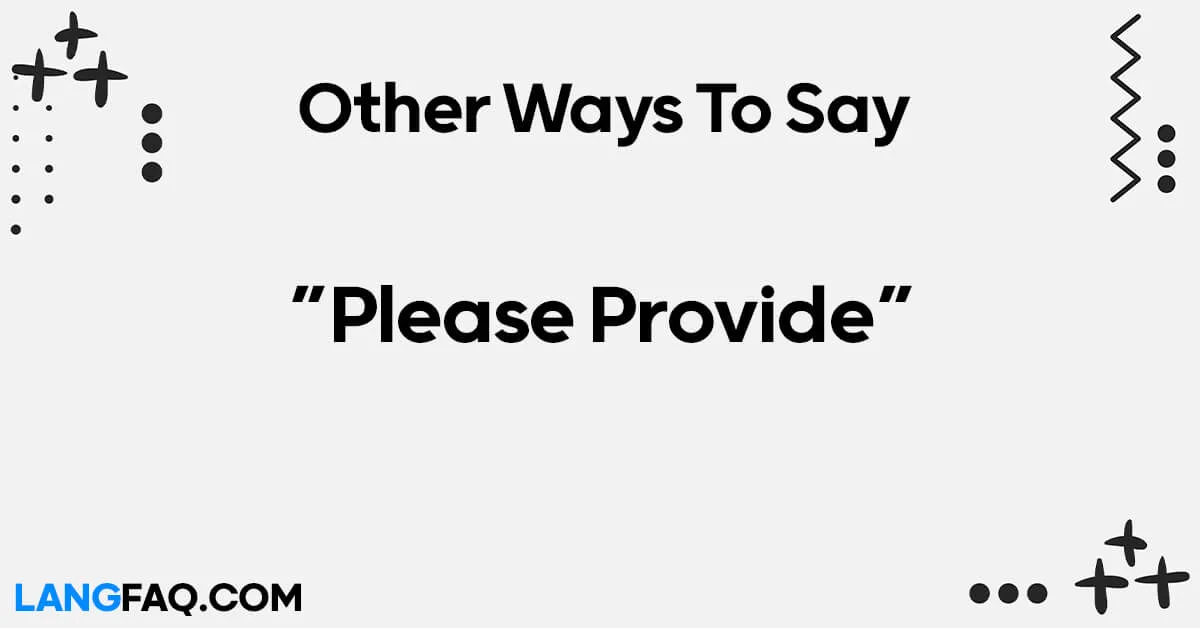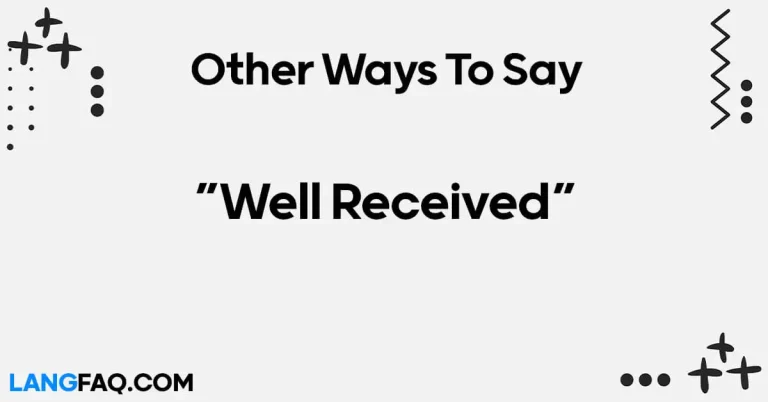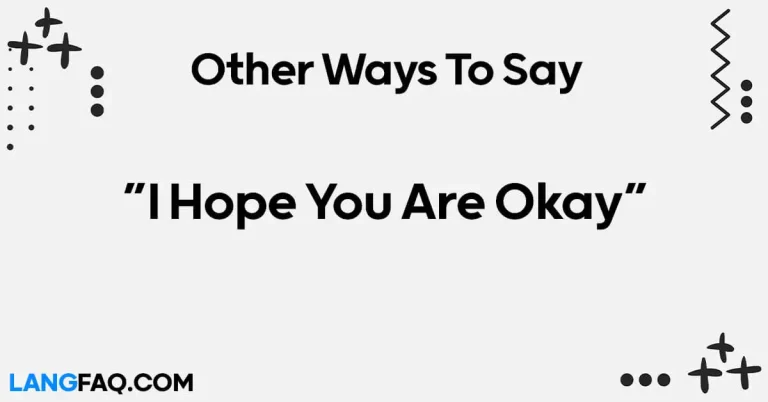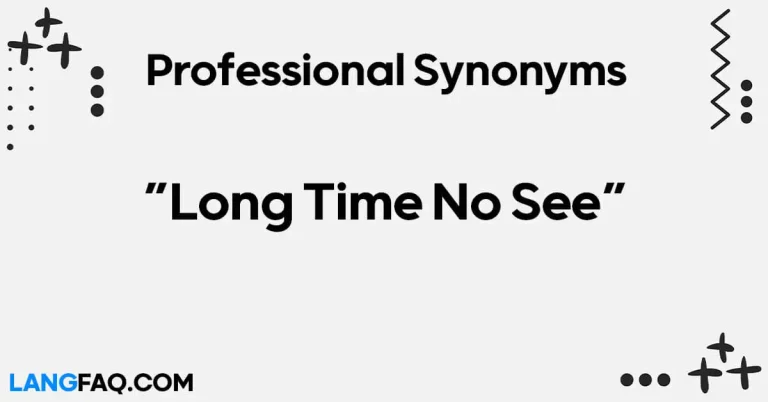Communication is the backbone of every interaction, and the way we request information plays a crucial role in fostering effective communication. In this article, we delve into “12 Other Ways to Say ‘Please Provide'” to equip you with a diverse set of expressions that can elevate your communication skills. From professional settings to casual conversations, these alternatives offer versatility and nuance to your language. Let’s explore these phrases that go beyond the conventional “Please Provide.”
12 Other Ways to Say “Please Provide”
Here are 12 alternative ways to say “Please Provide”:
- Kindly furnish the information.
- Could you share the details?
- I would appreciate it if you could provide.
- Can you supply the necessary information?
- Please offer the required details.
- Would you mind disclosing the information?
- I’m in need of the following details.
- Could you kindly give me the information?
- I’m seeking the necessary data.
- Can you provide me with the required information?
- Your assistance in sharing the details is valued.
- I urgently require the information, could you provide it?
Here’s a table with meanings and examples for the 12 other ways to say “Please Provide”:
| Expression | Meaning | Example |
|---|---|---|
| Kindly furnish the information | Politely provide the required details | Kindly furnish the information regarding the project. |
| Could you share the details? | Requesting the disclosure of specifics | Could you share the details of your findings? |
| I would appreciate it if you could provide | Seeking information with gratitude | I would appreciate it if you could provide insights on this. |
| Can you supply the necessary information? | Requesting essential data | Can you supply the necessary information for the report? |
| Please offer the required details | Asking for specific information | Please offer the required details about the event. |
| Would you mind disclosing the information? | Politely asking for details | Would you mind disclosing the information about the budget? |
| I’m in need of the following details | Expressing urgency for specific data | I’m in need of the following details for the presentation. |
| Could you kindly give me the information? | Polite request for details | Could you kindly give me the information on the project? |
| I’m seeking the necessary data | Expressing a search for essential info | I’m seeking the necessary data for the research paper. |
| Can you provide me with the required info? | Requesting necessary information | Can you provide me with the required information on time? |
| Your assistance in sharing the details is valued | Acknowledging help in providing info | Your assistance in sharing the details is valued and appreciated. |
| I urgently require the information, could you provide it? | Urgent request for data | I urgently require the information, could you provide it promptly? |
Effectively communicating the need for information involves utilizing a variety of expressions that suit different contexts. These alternatives not only add politeness and specificity but also cater to various levels of formality and urgency. By diversifying your language, you can create more engaging and nuanced communication experiences.
Is It Correct to Say “Please Provide”?
Certainly, “Please Provide” is a grammatically correct and commonly used phrase in English. It is a polite and concise way to request information, documents, or details from someone. The word “please” adds a courteous tone to the request, making it more respectful.
Example:
- “Could you please provide the updated project status?”
- “Please provide your contact information for our records.”
This phrase is commonly used in professional communication, emails, formal letters, and various other contexts where a polite request for information is appropriate. However, as seen in the previous responses, there are several alternative expressions that can be used to convey the same request with varying levels of formality and nuance. Choosing the appropriate alternative can add richness and specificity to your communication, depending on the context and your relationship with the recipient.
Professional Mail Example With “Please Provide”
Subject: Request for Additional Information
Dear [Recipient’s Name],
I trust this email finds you well. I am currently working on [specific project/task] and require some additional information to proceed efficiently.
Could you please provide the following details at your earliest convenience:
- [Specify the first piece of information needed]
- [Specify the second piece of information needed]
- [Continue the list as required]
Your prompt response to this request would greatly assist in maintaining our project timeline.
If you have any questions or need further clarification, please feel free to reach out. Your cooperation is highly appreciated.
Thank you and best regards,
[Your Full Name] [Your Position] [Your Company] [Contact Information]
Express Your Inquiry
In the realm of effective communication, clarity is paramount. Expressing curiosity and interest can make your request more engaging and inviting. Instead of a direct “Please provide,” consider using phrases like “I’m curious about” or “I’d like to know.”
Scenario: Professional Context In a professional setting, expressing your inquiry can set a positive tone for collaboration. For example, when working on a team project, you might say, “I’m curious about the progress on the latest deliverables. Could you provide an update during our team meeting?”
Example Sentence: “I’m curious about the budget allocation for the upcoming project. Could you provide some insights into the financial plan?”
Email Sample:
Subject: Inquiry Regarding Budget for Project XYZ
Dear [Recipient’s Name],
I trust this email finds you well. I’m curious about the budget allocation for Project XYZ and would appreciate it if you could provide some insights. This information will be valuable for the upcoming team meeting.
Thank you in advance for your assistance.
Best regards, [Your Name]
Variations:
- Colleagues: “I’m interested in understanding the budget for our joint project.”
- Friends: “I’m curious about your plans for the weekend. Any exciting events?”
Dictionary Insight: Curiosity, as defined by Cambridge Dictionary, is the eagerness to know or learn something.
Usage Tip: Use this phrase when you want to encourage open communication and show genuine interest in the information.
Seeking Your Input
Collaboration is often the key to successful endeavors, and seeking input rather than simply asking for information can foster a sense of teamwork. Phrases like “Your insights on” or “I value your perspective on” add a collaborative touch to your inquiry.
Scenario: Mentor-Mentee Relationship In a mentor-mentee dynamic, seeking input can empower the mentee. A mentor might say, “I value your perspective on the upcoming project. What insights do you have to share?”
Example Sentence: “I value your perspective on the market trends. Can you share your insights during our strategy meeting?”
Email Sample:
Subject: Seeking Your Input on Project Strategy
Dear [Recipient’s Name],
I hope this email finds you well. I truly value your perspective, and I’m seeking your input on the upcoming project’s strategy. Your insights will be instrumental in shaping our approach.
Looking forward to hearing from you.
Best regards, [Your Name]
Variations:
- Colleagues: “I value your insights on streamlining our processes.”
- Friends: “I value your perspective on choosing a vacation destination.”
Dictionary Insight: Input, as defined by Cambridge Dictionary, refers to ideas, advice, or information that you contribute to a group or activity.
Usage Tip: Use this phrase when you want to emphasize collaboration and acknowledge the importance of the other person’s input.
(Continued in the next response due to length constraints)
Could You Share the Details?
Encouraging a sense of sharing and openness can enhance communication. Instead of a straightforward request, phrases like “Could you share your thoughts?” create a more communal atmosphere, fostering a willingness to provide information.
Scenario: Casual Conversation In a casual setting, especially among friends, using this phrase can make the exchange more relaxed. For instance, “We’re planning a surprise party for Sarah. Could you share your thoughts on what theme would be perfect?”
Example Sentence: “We’re finalizing the agenda for the team retreat. Could you share your thoughts on the activities you’d enjoy?”
Email Sample:
Subject: Gathering Input for Team Retreat
Dear [Recipient’s Name],
Hope this email finds you in good spirits. As we plan our upcoming team retreat, we’re excited to gather everyone’s input. Could you share your thoughts on the activities you’d enjoy during the retreat? Your input is highly valued.
Looking forward to your ideas.
Best regards, [Your Name]
Variations:
- Colleagues: “Could you share your thoughts on improving our workflow?”
- Mentor-Mentee: “I’m working on a project. Could you share your insights to guide me?”
Dictionary Insight: Share, as defined by Cambridge Dictionary, means to have or use something at the same time as someone else.
Usage Tip: Use this phrase to create a collaborative atmosphere, especially when seeking opinions or ideas.
I’m in Need of the Following Details
Adding a touch of urgency to your request can be effective, especially when specific information is urgently required. Phrases like “I urgently require” or “I’m in need of” communicate a pressing need for the information sought.
Scenario: Project Deadline When working on a project with a tight deadline, expressing the urgency for required details becomes crucial. For example, “We’re nearing the project deadline, and I’m in need of the following details to finalize the report.”
Example Sentence: “I’m in need of the client’s feedback on the proposal. Can you provide it by the end of the day?”
Email Sample:
Subject: Urgent: Client Feedback Needed
Dear [Recipient’s Name],
I trust this message finds you well. As we approach the project deadline, I’m in need of the client’s feedback on the proposal. Your prompt response would greatly assist in finalizing our submission.
Thank you for your urgent attention to this matter.
Best regards, [Your Name]
Variations:
- Colleagues: “We have a meeting in an hour, and I’m in need of your input.”
- Friends: “I’m in need of your advice on choosing the right gift. Can we chat?”
Dictionary Insight: Need, as defined by Cambridge Dictionary, is the state of requiring something because it is essential or very important.
Usage Tip: Use this phrase when time is of the essence, and you require immediate attention to the request.
Could You Kindly Give Me the Information?
Politeness goes a long way in communication. Instead of a plain request, opt for more courteous alternatives like “Could you kindly provide?” or “I would appreciate it if you could share.”
Scenario: Formal Email Request In formal correspondence, expressing politeness can enhance the professional tone. For instance, “Could you kindly provide the financial report for the quarter by tomorrow’s meeting?”
Example Sentence: “Considering the tight deadline, could you kindly give me the information on the project’s progress?”
Email Sample:
Subject: Polite Request for Project Update
Dear [Recipient’s Name],
I hope this email finds you well. Given our upcoming project meeting, could you kindly provide an update on the project’s progress at your earliest convenience? Your prompt response is highly appreciated.
Thank you for your cooperation.
Best regards, [Your Name]
Variations:
- Colleagues: “Could you kindly share your thoughts on the proposal?”
- Mentor-Mentee: “I would appreciate it if you could provide guidance on my career path.”
Dictionary Insight: Kindly, as defined by Cambridge Dictionary, means in a way that shows you care and are thinking about the other person.
Usage Tip: Use this phrase when you want to maintain a formal and respectful tone in your communication.
Might I Ask For?
Introduce a formal tone to your inquiry by using expressions like “Might I ask for” or “Would it be possible for you to provide?” These convey respect and professionalism in your communication.
Scenario: Professional Inquiry In a professional context, especially when addressing someone in a higher position, using this phrase adds formality. For example, “Might I ask for your insights on the new company policy?”
Example Sentence: “Given your expertise in the field, might I ask for your guidance on the upcoming project?”
Email Sample:
Subject: Seeking Your Expertise
Dear [Recipient’s Name],
I trust this message finds you well. Considering your expertise in the field, might I ask for your insights on the upcoming project? Your guidance is highly valued.
Best regards, [Your Name]
Variations:
- Colleagues: “Would it be possible for you to provide feedback on the presentation?”
- Friends: “Would it be possible for you to share your recipe for those delicious cookies?”
Dictionary Insight: Might, as defined by Cambridge Dictionary, is used to express possibility or make a polite request.
Usage Tip: Use this phrase when addressing someone in a formal or senior position, adding a layer of respect to your request.
Your Assistance Would Be Valued
Acknowledging the importance of the other person’s help with phrases like “Your assistance would be valued” or “I would be grateful for your input” highlights the collaborative nature of the exchange.
Scenario: Team Collaboration In a team-oriented environment, expressing gratitude for assistance fosters a positive and cooperative atmosphere. For example, “Your assistance would be valued in finalizing the project timeline.”
Example Sentence: “Given the complexity of the task, your assistance would be valued in providing additional insights.”
Email Sample:
Subject: Seeking Your Assistance
Dear [Recipient’s Name],
I hope this email finds you well. We’re currently working on a challenging project, and given your expertise in the matter, your assistance would be valued. Could you please provide additional insights during our team meeting next week?
Thank you for your collaboration.
Best regards, [Your Name]
Variations:
- Colleagues: “I would be grateful for your input on the new marketing strategy.”
- Friends: “I’m planning a surprise party, and I would be grateful for your assistance in arranging decorations.”
Dictionary Insight: Assistance, as defined by Cambridge Dictionary, is the act of helping or providing support.
Usage Tip: Use this phrase when you want to convey appreciation for the other person’s collaboration and emphasize the value of their input.
For Your Information
In professional settings, precision matters. Instead of a generic request, consider saying “For your information” or “Could you furnish details for my reference?” These phrases indicate a need for specific information.
Scenario: Business Communication In a business context, being clear about the purpose of your request is crucial. For instance, “For your information, I will need detailed reports on the market trends for our upcoming presentation.”
Example Sentence: “For your information, I’ll require specific data on customer feedback for the upcoming client meeting.”
Email Sample:
Subject: Information Request for Client Meeting
Dear [Recipient’s Name],
I trust this email finds you well. For your information, I’ll need detailed reports on customer feedback for our upcoming client meeting. Your prompt attention to this matter is appreciated.
Thank you for your cooperation.
Best regards, [Your Name]
Variations:
- Colleagues: “For your information, I’ll need your analysis on the latest industry trends.”
- Mentor-Mentee: “For your information, I’m working on a project and would appreciate your insights.”
Dictionary Insight: Information, as defined by Cambridge Dictionary, is facts about a situation, person, event, etc.
Usage Tip: Use this phrase when you want to convey the specific purpose of your request, ensuring the recipient understands the context.
Inquire Regarding
When seeking information about a particular aspect, use expressions like “I would like to inquire regarding” or “Can you provide details about?” These pinpoint your request, leading to more accurate responses.
Scenario: Detailed Inquiry In situations where you require precise information, expressing your inquiry regarding a specific aspect is essential. For example, “I would like to inquire regarding the budget allocation for the upcoming project.”
Example Sentence: “I would like to inquire regarding the timeline for project completion. Can you provide details about the milestones we need to achieve?”
Email Sample:
Subject: Inquiry Regarding Project Timeline
Dear [Recipient’s Name],
I hope this message finds you well. I would like to inquire regarding the project timeline. Could you provide details about the milestones we need to achieve in the upcoming weeks? Your assistance in clarifying this matter is highly appreciated.
Thank you for your time.
Best regards, [Your Name]
Variations:
- Colleagues: “Can you provide details about the client’s expectations for the presentation?”
- Friends: “I would like to inquire regarding the plans for the weekend. Any exciting events?”
Dictionary Insight: Inquire, as defined by Cambridge Dictionary, is to ask for information.
Usage Tip: Use this phrase when you want specific details about a particular aspect, ensuring clarity in your request.
I Need the Following Information
Sometimes, clarity requires directness. Phrases like “I need the following information” or “Kindly share the details” maintain a level of assertiveness while remaining polite.
Scenario: Deadline-driven Task In situations where time is of the essence, expressing a clear need for specific information is crucial. For example, “I need the following information to meet the project deadline.”
Example Sentence: “I need the following information to prepare the presentation for the client meeting. Can you provide it by the end of the day?”
Email Sample:
Subject: Request for Essential Information
Dear [Recipient’s Name],
I trust this email finds you well. I need the following information to meet the project deadline. Could you kindly share the details at your earliest convenience? Your prompt response is highly valued.
Thank you for your cooperation.
Best regards, [Your Name]
Variations:
- Colleagues: “I need the following information to finalize the budget proposal.”
- Mentor-Mentee: “I need the following information to progress in my research. Can you guide me?”
Dictionary Insight: Need, as defined by Cambridge Dictionary, is the state of requiring something because it is essential or very important.
Usage Tip: Use this phrase when you require specific information urgently, ensuring a direct yet polite communication style.
Seeking Clarification
When information needs clarification, opt for expressions like “I would appreciate clarification on” or “Could you provide additional details?” These foster a two-way communication flow.
Scenario: Complex Instructions In situations where instructions or details are unclear, seeking clarification is essential. For example, “I would appreciate clarification on the steps involved in implementing the new software.”
Example Sentence: “I would appreciate clarification on the client’s expectations for the project. Could you provide additional details on their specific requirements?”
Email Sample:
Subject: Request for Clarification
Dear [Recipient’s Name],
I hope this email finds you well. I would appreciate clarification on the client’s expectations for the project. Could you provide additional details on their specific requirements? Your assistance in clarifying this matter is crucial for our success.
Thank you for your time.
Best regards, [Your Name]
Variations:
- Colleagues: “I would appreciate clarification on the changes in the project timeline.”
- Friends: “Could you provide additional details about the party? I want to ensure I don’t miss anything.”
Dictionary Insight: Clarification, as defined by Cambridge Dictionary, is the act of making something clear or easy to understand.
Usage Tip: Use this phrase when aspects of the information provided are unclear, ensuring a smooth and accurate understanding.
FAQs
Q: Are these alternatives suitable for formal settings? Absolutely. Many of these alternatives, such as “Could you kindly provide?” or “Your assistance would be valued,” are well-suited for professional communication, adding a touch of formality and respect.
Q: How can I convey urgency without sounding demanding? Using phrases like “I urgently require” or “I’m in need of” conveys urgency while maintaining a polite tone. It shows the importance of the information without being overly assertive.
Q: Can these alternatives be used in written communication? Certainly. These expressions are versatile and can be seamlessly incorporated into both verbal and written communication, enhancing the clarity and effectiveness of your message.
Q: Are there situations where directness is preferred? Yes, there are instances where directness is crucial. Phrases like “I need the following information” or “Kindly share the details” can be employed when clarity is a top priority.
Q: How can I make my request more collaborative? Opt for phrases like “Your insights on” or “I value your perspective on” to foster a collaborative environment. This encourages the other person to actively contribute to the exchange.
Q: Can these alternatives be used in casual conversations? Absolutely. While some alternatives may lean towards formality, expressions like “I’d like to know” or “Could you share your thoughts?” can be comfortably used in casual settings.
Conclusion
Mastering the art of requesting information is an essential skill that can significantly impact your professional and personal interactions. By incorporating these 12 alternative expressions for “Please Provide,” you not only enhance your communication skills but also add depth and nuance to your language. Experiment with these phrases in different situations, and watch as your ability to solicit information evolves. Effective communication starts with the way we ask for information—make it a memorable and positive experience.







